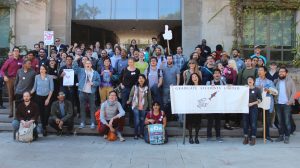University of Chicago grad assistants opt for union
By Kevin Beese Staff reporter — November 6, 2017
University of Chicago graduate assistants conduct a pre-election rally the day before polls opened for a vote this fall on whether they should unionize. More than 70 percent of the GA’s felt they should have union representation. (Photo courtesy of Chaz Lee)
Seeking better access to health care, housing and childcare, as well as improved working conditions, graduate assistants at the University of Chicago have opted to unionize.
More than 70 percent of the university’s graduate assistants opted to create a union when a vote was taken earlier this fall.
For graduate assistant Chaz Lee, the move is about making sure GA’s have a say in university issues.
“Graduate students deserve to participate in making decisions that impact not only us but also our undergraduate students as well as the university community as a whole. We want a say in determining our compensation and benefits,” Lee said. “We look forward to working with the university on its commitment to improving graduate working and training conditions. We don’t want to have undue financial burdens like ending up with an expensive health care bill. The university is a democratic body. We now have legal representation.”
Graduate Students United has existed on the Hyde Park campus since 2007, but it took a yearlong campaign to clear the way for a GA unionization vote.
“In some ways, we’ve been preparing for this since 2007,” said Lee, who is in his seventh year teaching music history at the Hyde Park campus.
He said graduate students play a vital role in the health of the university community.
“Graduate students perform a lot of essential teaching at the university,” Lee said. “Every undergraduate here takes classes that have a graduate assistant instructor. Graduate employees are the primary authors on a lot of the published research that bears the university’s name.”
Lee said struggles with GA’s getting their paychecks on time is just one of the triggers that caused graduate assistants to consider unionizing. Other concerns of the GA’s, he said, are ensuring access to health care for them and their families, adequate compensation, housing and the increasing cost of living in the Hyde Park neighborhood.
“It’s increasingly more difficult to find affordable housing in Hyde Park. The university sold off much of its subsidized housing,” Lee said. “… There is a lot more the university could do. One of our goals is to raise the floors on basic issues such as access to affordable healthcare and childcare. We want transparent work expectations and compensation that is adequate to the work put in.”
While many public school graduate students have had union representation, in some cases as long as four decades, private school GA’s unionizing is a more recent phenomenon.
Graduate assistants at Loyola University also recently opted to unionize.
The university is seeking a National Labor Relations Board ruling on whether graduate students are university employees.
“The NLRB has a long history of recognizing that graduate assistants are foremost students and not employees under federal labor law,” the university said in a statement. “The University of Chicago has joined several other universities in asking the board to revisit its recent reversal of position on this question, and our request is pending. We continue to have concerns about the impact of a graduate student union on the university’s mission of creating and imparting knowledge through direct mentorship, teaching and individually guided research and writing.”
University representatives said that despite their belief that the graduate assistants should not be allowed to unionize, the GA’s remain a vital part of the University of Chicago community.
“We respect that reasonable people can come to different conclusions on the issue of graduate student unionization,” the university continued in its statement. “Regardless of the outcome of the legal process, we will continue to support our graduate students and respect their contributions.
“Since 2007, the university has invested more than $2 billion in direct financial support for graduate students, from stipends to health care and more, in the absence of union representation. Graduate students from across the university have worked directly with faculty and staff to improve graduation education and graduate student life. We recognize that there remains room for improvement, and the university is committed to continuous efforts to enhance support for graduate students.”
Read the current issue of the Cook County Chronicle
Free subscription to the digital edition of the Cook County Chronicle
— University of Chicago grad assistants opt for union —



